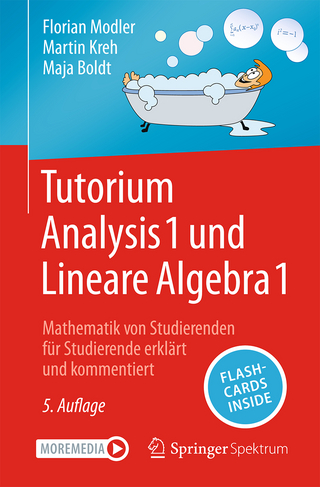
Advanced Engineering Mathematics, 10e Student Solutions Manual and Study Guide, Volume 2: Chapters 13 - 25
John Wiley & Sons Inc (Verlag)
978-1-118-26670-0 (ISBN)
- Lieferbar (Termin unbekannt)
- Versandkostenfrei
- Auch auf Rechnung
- Artikel merken
This is the student Solutions Manual to accompany Advanced Engineering Mathematics, Volume 2, Tenth Edition.
This market-leading text is known for its comprehensive coverage, careful and correct mathematics, outstanding exercises, and self contained subject matter parts for maximum flexibility. The new edition continues with the tradition of providing instructors and students with a comprehensive and up-to-date resource for teaching and learning engineering mathematics, that is, applied mathematics for engineers and physicists, mathematicians and computer scientists, as well as members of other disciplines.
Erwin O. Kreyszig was a German Canadian applied mathematician and the Professor of Mathematics at Carleton University in Ottawa, Ontario, Canada. He was a pioneer in the field of applied mathematics: non-wave replicating linear systems.
PART D: COMPLEX ANALYSIS…257
Chapter 13. Numbers and Functions. Complex Differentiation…257
13.1 Complex Numbers and Their Geometric Representation…258
13.2 Polar Form of Complex Numbers. Powers and Roots…261
13.3 Derivative. Analytic Function…267
13.4 Cauchy–Riemann Equations. Laplace’s Equation…269
13.5 Exponential Function…274
13.6 Trigonometric and Hyperbolic Functions. Euler’s Formula…277
13.7 Logarithm. General Power. Principal Value…279
Chapter 14: Complex Integration…283
14.1 Line Integral in the Complex Plane…283
14.2 Cauchy’s Integral Theorem…288
14.3 Cauchy’s Integral Formula…291
14.4 Derivatives of Analytic Functions…295
Chapter 15: Power Series, Taylor Series…298
15.1 Sequences, Series, Convergence Tests…298
15.2 Power Series…303
15.3 Functions Given by Power Series…306
15.4 Taylor and Maclaurin Series…309
15.5 Uniform Convergence. Optional…312
Chapter 16: Laurent Series. Residue Integration…316
16.1 Laurent Series…316
16.2 Singularities and Zeros. Infinity…320
16.3 Residue Integration Method…322
16.4 Residue Integration of Real Integrals…326
Chapter 17: Conformal Mapping…332
17.1 Geometry of Analytic Functions: Conformal Mapping…333
17.2 Linear Fractional Transformations. (Möbius Transformations)…339
17.3 Special Linear Fractional Transformations…343
17.4 Conformal Mapping by Other Functions…347
17.5 Riemann Surfaces. Optional…352
Chapter 18: Complex Analysis and Potential Theory…353
18.1 Electrostatic Fields…354
18.2 Use of Conformal Mapping. Modeling…358
18.3 Heat Problems…359
18.4 Fluid Flow…361
18.5 Poisson’s Integral Formula for Potentials…364
18.6 General Properties of Harmonic Functions. Uniqueness Theorem for the Dirchlet Problem…367
PART E: NUMERIC ANALYSIS…373
Chapter 19: Numerics in General…373
19.1 Introduction…374
19.2 Solution of Equations by Iteration…379
19.3 Interpolation…384
19.4 Spline Interpolation…389
19.5 Numeric Integration and Differentiation…393
Chapter 20: Numeric Linear Algebra…400
20.1 Linear Systems: Gauss Elimination…400
20.2 Linear Systems: LU-Factorization, Matrix Inversion…404
20.3 Linear Systems: Solution by Iteration…410
20.4 Linear Systems: Ill-Conditioning, Norms…415
20.5 Least Squares Method…419
20.6 Matrix Eigenvalue Problems: Introduction…424
20.7 Inclusion of Matrix Eigenvalues…424
20.8 Power Method for Eigenvalues…429
20.9 Tridiagonalization and QR-Factorization…434
Chapter 21: Numerics for ODEs and PDEs…442
21.1 Methods for First-Order ODEs…442
21.2 Multistep Methods…445
21.3 Methods for Systems and Higher Order ODEs…446
21.4 Methods for Elliptic PDEs…452
21.5 Neumann and Mixed Problems. Irregular Boundary…454
21.6 Methods for Parabolic PDEs…459
21.7 Method for Hyperbolic PDEs…462
PART F: OPTIMIZATION, GRAPHS…465
Chapter 22: Unconstrained Optimization. Linear Programming…465
22.1 Basic Concepts. Unconstrained Optimization: Method of Steepest Descent…465
22.2 Linear Programming…471
22.3 Simplex Method…474
22.4 Simplex Method. Difficulties…479
Chapter 23: Graphs. Combinatorial Optimization…482
23.1 Graphs and Digraphs…482
23.2 Shortest Path Problems. Complexity…484
23.3 Bellman’s Principle. Dijkstra’s Algorithm…487
23.4 Shortest Spanning Trees: Greedy Algorithm…490
23.5 Shortest Spanning Trees: Prim’s Algorithm…493
23.6 Flows in Networks
23.7 Maximum Flow: Ford–Fulkerson Algorithm…497
23.8 Bipartite Graphs. Assignment Problems…499
PART G: PROBABILITY, STATISTICS…502
Chapter 24: Data Analysis, Probability Theory…502
24.1 Data Representation. Average. Spread…502
24.2 Experiments, Outcomes, Events…507
24.3 Probability…509
24.4 Permutations and Combinations…512
24.5 Random Variables. Probability Distributions…516
24.6 Mean and Variance of a Distribution…520
24.7 Binomial, Poisson, and Hypergeometric Distributions…523
24.8 Normal Distribution…526
24.9 Distribution of Several Random Variables…530
Chapter 25: Mathematical Statistics…533
25.1 Introduction. Random Sampling…533
25.2 Point Estimation of Parameters…533
25.3 Confidence Intervals…536
25.4 Testing of Hypotheses. Decisions…540
25.5 Quality Control…543
25.6 Acceptance Sampling…544
25.7 Goodness of Fit. Chi-Square Test…547
25.8 Nonparametric Tests…549
25.9 Regression. Fitting Straight Lines. Correlation…551
| Erscheint lt. Verlag | 8.6.2015 |
|---|---|
| Verlagsort | New York |
| Sprache | englisch |
| Maße | 216 x 277 mm |
| Gewicht | 748 g |
| Themenwelt | Mathematik / Informatik ► Mathematik ► Algebra |
| Mathematik / Informatik ► Mathematik ► Angewandte Mathematik | |
| ISBN-10 | 1-118-26670-6 / 1118266706 |
| ISBN-13 | 978-1-118-26670-0 / 9781118266700 |
| Zustand | Neuware |
| Informationen gemäß Produktsicherheitsverordnung (GPSR) | |
| Haben Sie eine Frage zum Produkt? |
aus dem Bereich


